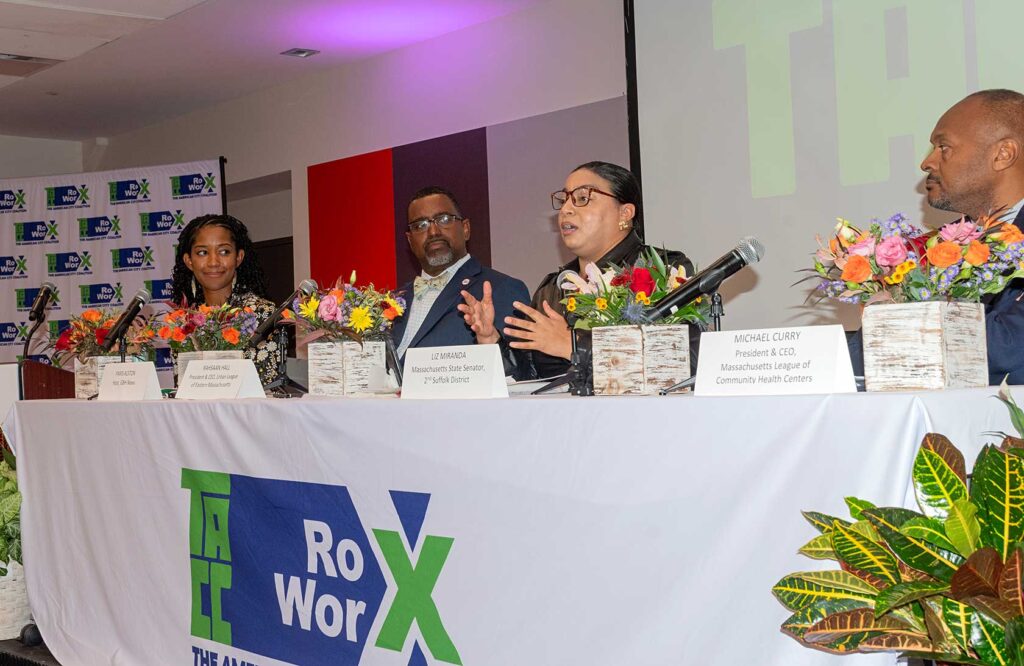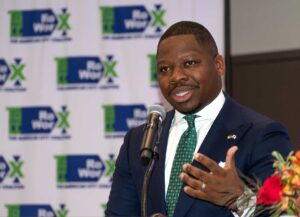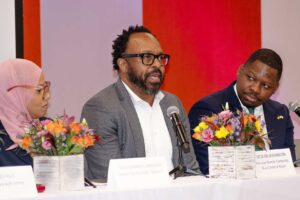Collaboration takes center stage for STEM workforce development at Roxbury Worx conference

Local leaders in life sciences, climate technology, health care and workforce development advocated for close collaboration as organizations seek to close employment gaps in growing science and technology fields for Black and Brown communities in the city.
At the third annual Roxbury Worx conference, hosted by The American City Coalition (TACC) at Roxbury Community College on Nov. 14, panelists and attendees centered the need for an interconnected ecosystem of programming.
The Roxbury Worx initiative focuses on bringing “middle-skills” workers — those with an associate degree or some college but don’t hold a bachelor’s — from Roxbury into the growing science, technology, engineering and mathematics fields of life sciences, environmental and climate technology and health care.
For Rev. Willie Bodrick II, president and CEO of TACC, a piece of that work is changing how those industries view residents in Boston’s most diverse neighborhoods.

Rev. Willie Bodrick II, president and CEO of The American City Coalition, delivers welcoming remarks at the Roxbury Worx conference, at Roxbury Community College, Nov. 14. PHOTO: AVERY BLEICHFELD/BAY STATE BANNER
“Too many times people talk about Roxbury, Dorchester, Mattapan as low-skills or low educational attainments but … we always knew that wasn’t the case,” he said, highlighting how lived experience can bring unique perspectives to roles in the STEM fields the initiative focuses on.
Speakers at the event pointed to the moment as one of bright opportunity, with new workforce development programs aiming to open doors to life sciences jobs for prospective employees without a college degree and an expanding green technology industry presenting opportunities for individuals to enter fields as they start to grow.
“What is great about this time is a lot of industries are new. We’re at the ground floor. We can be a part of those industries,” said William Watkins, vice president of digital strategy and partnerships at the Urban League of Eastern Massachusetts. “But also, at the same time . . . we don’t have enough skilled workers to move into a lot of this great opportunity.”
Speakers at the event said that fostering partnerships will be key to that work of expanding opportunities for Black and Brown communities in Boston.
“We’re trying to create the connective tissue to make sure that the ecosystem works for everybody. If we’re serving the same people, we shouldn’t be competing to serve,” Bodrick said.
Those partnerships are an important component of closing gaps in employment in these STEM fields, participants said during a panel on local collaboration.
It was a sentiment shared by Duval Rodrigues, the program associate with the academic services team at JVS Boston, who was manning a table and talking to event attendees and RCC students who passed by. He called partnership “integral” to workforce training in STEM fields like biotechnology, which his work focuses on.
“Any industry needs to have a strong networking community; you need to have partners,” he said. “We don’t live in the silo. Because biotech is booming, you really need to approach the industry from every possible angle.”
It’s also about realizing what different groups can bring to the table, said Joanna da Cunha-Semedo, senior environmental justice program manager at Resonant Energy, a local solar company working with local nonprofits and community organizations to install solar panels and working to train community members to work installing the te.
“I think it’s always a win-win situation when you are really thinking about it, not being necessarily a competition, but how can we add to the conversation? How can we add to this field?” said da Cuhna-Semedo.
That sense of partnership building is also at the heart of the Roxbury Worx initiative generally, which, outside of its annual conference, includes ongoing efforts from working groups focused on the different areas of employment.
Aisha Francis, president and CEO of Benjamin Franklin Cummings Institute of Technology, said the working groups have been the push that has allowed the different groups to break barriers and come together effectively.
“In those conversations, that’s where the ideas and the collaboration are moving from conversation to action,” Francis said during the panel on collaborative efforts. “It’s in the continuity of the working groups, and in the trust that is being built there between members of our staff.”
While communication between different organizations working in the space isn’t new, the increased sense of collaboration from initiatives like Roxbury Worx has decreased competition in exchange for building a more collective sense of how the groups can serve Roxbury community members, Watkins said.
“It’s not like we never talked, but what was lacking was taking down that veil of competition, of ‘This is mine; this is your territory,’” Watkins said. “I love a lot of the groups that have come in, because it’s not about that. It’s like, ‘How can I add value to what it is that you’re already doing? How can I take you to the next level?’”
And those partnerships will be an important step in increasing proactive and effective communication with communities that have, so far, largely been left out of these tech fields.
“By the time information makes it to our communities and we’re pursuing things, we sometimes miss the boat, or the boat has missed us,” Francis said. “We want to make sure that our students and our audience of potential students knows what building energy management is, that they know what clean manufacturing is that they are aware of two-year pathways to receive associate degrees in fields that pay very well.”
Building partnerships can help build credibility and extend reach, she said.
Bodrick pointed to improving outreach as a priority for TACC and Roxbury Worx, while a research presentation at the event by Kerry McKittrick, co-director of the Harvard Project on Workforce, identified that communication as a gap for lower-income communities.
“People need accurate information about the labor market, about opportunities, about wages, about skills,” she said. “Some research shows that a share of community college students has shown that people often have inaccurate information.”
At the event, panelists also placed the efforts around diverse employment opportunities in the context of the re-election of former President Donald Trump, whose legacy and campaign promises have both included efforts to reduce diversity, equity and inclusion initiatives.
Through that lens, leaders advocated for increased state and local leadership to ensure that Massachusetts continues to encourage efforts to equitably grow industries like the ones at the heart of the Roxbury Worx initiative.
State Sen. Liz Miranda, who sat on a panel about the post-election landscape, emphasized the impact that state government has on everyday people.
“Oftentimes I talk to my family and friends about that I really did not understand how important state legislature was in politics or in government or in our daily lives,” Miranda said. “I measure how we are doing nationally by how I’m feeling we’re doing locally.”
She said she sees this moment as one to have a hyper-local focus on making Massachusetts “the best state in the nation.”
Rahsaan Hall, president and CEO of the Urban League of Eastern Massachusetts, said that despite concerns he has about the impact Trump’s return to office will have on diverse employment efforts, he has hope in what can come from this moment.
“The hope is in our ability to galvanize and mobilize ourselves and organize community because of the threats,” he said. “I think when people are fearful, that’s an opportunity to tap into that.”
And in the spirit of local change, speakers at the event also cast the work around expanding equitable employment in the STEM fields as a parallel to the ongoing redevelopment of Nubian Square, which includes a focus on STEM employment as well as other facets of life like arts and culture.

Lecolion Washington (center), executive director of the Community Music Center of Boston, speaks as District 7 City Councilor Tania Fernandes Anderson (left) and Rev. Willie Bodrick II (right) listen during a panel discussion about the revitalization of Nubian Square and Roxbury, at the Roxbury Worx conference, Nov. 14. Speakers at the event framed the redevelopment in Nubian Square as a parallel to efforts to diversify life science, green tech and health care jobs, the goal at the center of the Roxbury Worx initiative. PHOTO: AVERY BLEICHFELD/BAY STATE BANNER
On Nov. 14, Franklin Cummings Technology laid the last steel beam in the construction of its new campus at 1011 Harrison Ave. in Nubian Square. The school runs a number of STEM-focused associate degree programs, including a biotechnology curriculum it launched this fall.
Nearby, the upcoming Nubian Square Ascends development is set to include about 40,000 square feet of lab training space, where it will aim to train Black and Brown community members from neighborhoods like Roxbury, Dorchester and Mattapan through partnerships with Franklin Cummings Tech as well as other institutions like Northeastern University, Roxbury Community College and MassBioEd.
But during a panel on a potential Roxbury Renaissance, speakers saw the opportunity as one that goes beyond just burgeoning science fields and has broader potential for the nearby community.
In that work, District 7 City Councilor Tania Fernandes Anderson called for guardrails and efforts to help residents continue to stay in the area, even as proposed redevelopment makes the neighborhood more attractive to newcomers.
“We are not going to be able to develop without gentrification. It’s just impossible,” Fernandes Anderson said. “The question is, how do we mobilize in order and to hold the whites or upper-class Blacks that are coming in to account, to say, ‘You are now a part of this community and you are now responsible for becoming a part of the solution,’ which is building this Black Wall Street, prioritizing economic mobility and independence for Black people.”
But speakers on that panel were expectant to see many of those changes in Nubian Square soon. Bodrick pointed to the pending move of Community Music Center of Boston into the area, as well as the opening of business like Jazz Urbane in the Bruce C. Bolling Municipal Building and the arrival of institutions like Franklin Cummings Tech — the school expects to finish construction in 2025.
“All of these places will be active, hopefully by this time next year, and so we’re going to see a drastically different square,” Bodrick said.






